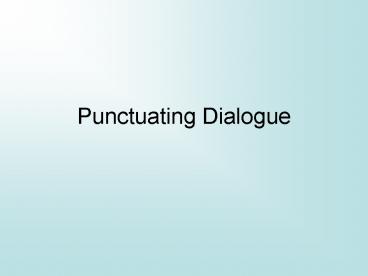Punctuating Dialogue - PowerPoint PPT Presentation
1 / 8
Title:
Punctuating Dialogue
Description:
Punctuating Dialogue *Use quotation marks at the beginning and end of a direct quotation. A direct quotation is the exact words of a writer or a speaker. – PowerPoint PPT presentation
Number of Views:280
Avg rating:3.0/5.0
Title: Punctuating Dialogue
1
Punctuating Dialogue
2
Use quotation marks at the beginning and end of
a direct quotation.
- A direct quotation is the exact words of a writer
or a speaker. - The guide said, The giant squid is one of the
largest creatures in the sea. - Dont use quotation marks to set of an indirect
quotation. - The guide said that the giant squid is one of the
largest creatures in the sea.
3
In dialogue punctuate a speakers words with a
comma, a question mark, or an exclamation mark.
- Early sailors believed giant squid were sea
monsters, our guide explained. - Just how big is a giant squid? asked Tyrell.
- Believe it or not, some may be 75 feet long!
said the guide.
4
Place a comma after explanatory words, such as
she said and he asked, that appear at the
beginning of a sentence.
- Tyrell asked, Just how big is a giant squid?
5
Enclose both parts of a divided quotation in
quotation marks.
- Do not capitalize the first word of the second
part unless it begins a new sentence. - Wonder, said Rebecca, whether the giant squid
is dangerous to humans. - You wonder? asked Tyrell. Look at the size of
those tentacles!
6
Start a new paragraph and begin the paragraph
with a set of quotation marks to show a change in
speakers.
- Dont be afraid, said Rebecca.
Although the giant squid is large, it doesnt
usually come into contact with humans. - Im glad to hear that, Tyrell replied,
because that toothed tongue looks nasty.
7
You Try It!Correct the punctuation errors.
- 1. Are you surprised to learn that, a great
majority of deep-sea fishes have light-generating
capabilities? asked the guide. - 2. Richard Ellis explains in his book Deep
Atlantic that there are three ways whereby sea
animals create living light by releasing energy
to special organs, by ejecting glowing chemicals,
and by hosting bacteria that glow.
8
What do we need to do here?
- Thats pretty cool, Tim stated. Yes, it really
is agreed the guide.































